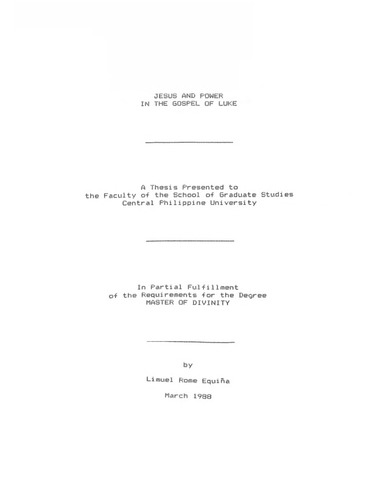Jesus and power in the Gospel of Luke
| dc.contributor.author | Equiña, Limuel R. | |
| dc.date.accessioned | 2021-04-13T06:58:50Z | |
| dc.date.available | 2021-04-13T06:58:50Z | |
| dc.date.issued | 1988 | |
| dc.identifier.citation | Equiña, L. R. (1988). Jesus and power in the Gospel of Luke (Unpublished Master's thesis). Central Philippine University, Jaro, Iloilo City. | en_US |
| dc.identifier.uri | https://hdl.handle.net/20.500.12852/775 | |
| dc.description | Abstract only | en_US |
| dc.description.abstract | Against the background of domination and power struggle both in the religious and the political conditions of the time the author attempts to explore the biblical theology of power according to the Gospel of Luke. This study focuses on the Jewish experiences under a series of foreign political powers, namely, the Persians, the Hellenists and the Romans. The survival of the Jews through the complexities of cultures and political pressures which they encountered was fundamentally fashioned by their nationalism and religious fanaticism. The Jews remained faithful to their own indigenous practices and beliefs in a monotheistic God which they were ready to defend at the cost of their lives. But on the whole, the Jews were obedient to the policy of the dominant power as long as the latter did not interfere in their religious life. In the Gospel of Luke, the evangelist portrayed Jesus as one in constant conflict with the Jewish religious groups. For the religious authorities, the teachings and deeds of Jesus appeared revolutionary and a threat to the existing religious system. As such, they eliminated Jesus -From the Jewish society. For Luke, though Jesus was tried and crucified under the Roman law, the Jewish religious leaders were especially responsible for his death as they were the "masterminds" of the plot. In his Gospel, Luke described Jesus’ power as both institutive and operative. God authorized Jesus to exercise his messianic power in the form of miraculous works and prophetic teaching and preaching in order to fulfill the divine plan for the world. Moreover, Jesus gave his power and authority (on a limited basis) to his disciples for the continuance of his ministry on earth until he comes back. In his exercise of institutive power, Jesus followed the model of servanthood cited by the prophetic oracles of Isaiah. With that motif, Jesus rejected the use of violence and might as a pattern for ruling. Rather, he taught service and humbleness as the paradigm of greatness. This new teaching and philosophy of leadership was properly demonstrated by Jesus himself in his life and works which challenged the ruling elite and those who dreamed of power and glory. The historical and biblical findings serve as the foundation for the author’s reflection on the present religious and political struggle for power. His study was made with the belief that his findings therein would offer a challenge to the religious and political leaders as well as to the people to re-examine their own systems of leadership, rule and cooperation for the common good so that a more humane and ordered society of people might emerge in this epoch of complexities and illusions. | en_US |
| dc.format.extent | x, 129 leaves | en_US |
| dc.language.iso | en | en_US |
| dc.subject.ddc | TheoLib Thesis 207.2 Eq56 | en_US |
| dc.subject.lcsh | Power (Christian theology) | en_US |
| dc.subject.lcsh | Jesus Christ | en_US |
| dc.subject.lcsh | Bible. Luke | en_US |
| dc.subject.lcsh | Bible. Luke--Commentaries | en_US |
| dc.subject.lcsh | Judaism | en_US |
| dc.title | Jesus and power in the Gospel of Luke | en_US |
| dc.type | Thesis | en_US |
| dc.description.bibliographicalreferences | Includes bibliographical references | en_US |
| dc.contributor.chair | Herradura, Elma S. | |
| dc.contributor.committeemember | Acosta, Rodolfo P. | |
| dc.contributor.committeemember | Mosher, Carl Stephen | |
| dc.contributor.committeemember | Gumban, Johnny V. | |
| dc.contributor.committeemember | Perez, Enrique | |
| dc.contributor.committeemember | Parreño, Tomas | |
| dc.contributor.department | School of Graduate Studies | en_US |
| dc.description.degree | Master of Divinity | en_US |
| local.relation.associatedcontent | https://repository.cpu.edu.ph/handle/20.500.12852/2689 Journal article published in Southeast Asia Journal | en |


